I love anthropology.
The history of people groups, the study of their development, and the analyzation of their culture is beautiful to me.
I have such a fascination with native americans. Maybe it’s because I grew up in Northeast Ohio where Native Americans originally settled the land and, despite our bloody conquistadorian history, attempts to pay them homage are weaved in modern culture. I took field trips in elementary school to the Cuyahoga River, named for its crookedness by the tribe that settled there. Our baseball team, The Cleveland Indians, was named in a much less politically correct time.
I don’t know if it was fourth-grade social studies or not, but I have always appreciated the natives of a given land. I think that they have so much to teach us, more today than ever before.
My most recent musings on indigenous culture were spurred by a project in one of my classes last fall. We were to analyze our cultures and recognize modern tribes within. I chose “The Organics” and humorously mocked their culture, in my own right, in that I am one of them.
Just after the project, I started looking at my own life and the tribes that I see, am a part of, or have been a part of at different phases of life. I reflected on times when I was tribeless and floating in the abyss. I analyzed the world around me through this lens. I analyzed myself.
It’s easy for me to be alone. People require energy. They talk. They have opinions. Then, to make it worse, they want me to talk and they want to know my opinions. It’s terrible.
The worst part, though, is that I need people. I can’t live without them. I have tried. I got so sick of people that I isolated myself from all things that annoyed me. All that I found was that I eventually annoyed myself back into community.
The key for me was finding the right tribe. The right group of people to share life with. New York is an easy place to be unnoticed, especially if that is your goal. It took me seven years of cycling through fluff and anonymity, but I eventually found my tribe. I eventually found people that I trust. I eventually found people that I sincerely want to be around. I eventually found myself.
I thought about this again when I got to Bogota. I had been in DR for a month, essentially without a tribe. There were people to share life with. Good people. But i was relating to them with the understanding that I had not planted roots on Dominican soil. This is not to say that I did not make authentic friendships. I know that I did. We did not have shared experiences in the past that allowed us to process the present in the same context. We were working on those experiences while I was there.
Then my professor came to observe me. A familiar face in the airport. A few days of summarizing, reflecting, and debriefing. A healthy close to a month of intenseness.
Then we flew to Colombia. I saw my other professor in the airport. I saw the rest of my class at a restaurant. I saw some of the faces that I had been carrying with me.
I saw one of my tribes.
This specific tribe, this group of urban studies students, is so incredibly unique. We are devoted to the arts, to philanthropy, to sustainability, to resiliency, to hope, to faithing, and to one another in a way that I have never experienced before, at least not with more than one person at a time.
We’ve been together, as a tribe, in Bogota, for a few days. We laugh together, we dance together, we build together, and we process together.
The contrast of this experience with my month of solidarity in the Dominican has reaffirmed what I already knew. I need people. I need to process life alongside close friends that validate and support and challenge me. I need to do the same for them.
Sometimes I have to force myself into it, but I know myself well enough to know to do that.
I’m still figuring out balance. It’s never been my strength.
But I’m headed in the right direction. Towards wholeness.
With people.
It’s community. It’s the good life.


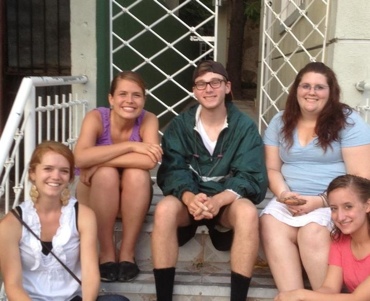
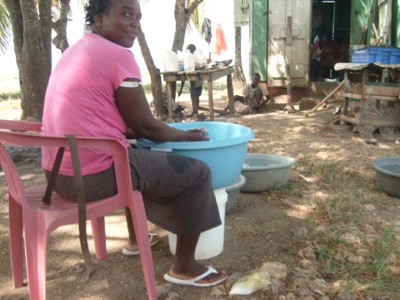
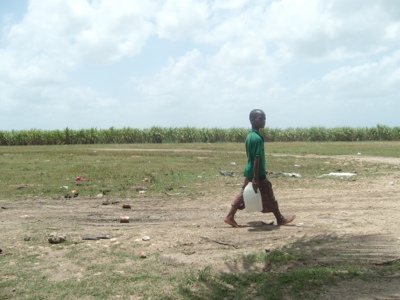
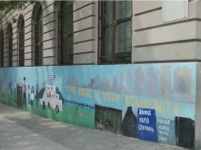
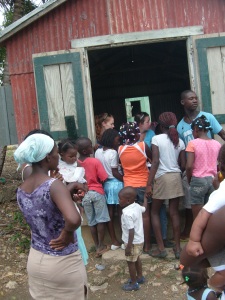


 Men were playing dominoes just outside the door. I felt like I was home, the way I feel when I walk down any street in the heights when the temperature is above 70 degrees. Orlando stayed with the Domino men and I walked through the house on my own. A variety of people, involved in a variety of programs through the hospital, were scattered about. None of them knew me. None of them knew were I was staying or where I was supposed to be. None of them knew where my contact people were. They did, however, have internet access, and really, that’s pretty much all you need to figure out most things. I emailed my contacts, told them I was here, that I was tired, that I would be taking a nap at the end of the hallway, and headed off to catch up on the countless hours of sleep that I had missed in the past 5 days. I hadn’t laid down in 36 hours, so my hierarchy of needs had sleep on the top of list.
Men were playing dominoes just outside the door. I felt like I was home, the way I feel when I walk down any street in the heights when the temperature is above 70 degrees. Orlando stayed with the Domino men and I walked through the house on my own. A variety of people, involved in a variety of programs through the hospital, were scattered about. None of them knew me. None of them knew were I was staying or where I was supposed to be. None of them knew where my contact people were. They did, however, have internet access, and really, that’s pretty much all you need to figure out most things. I emailed my contacts, told them I was here, that I was tired, that I would be taking a nap at the end of the hallway, and headed off to catch up on the countless hours of sleep that I had missed in the past 5 days. I hadn’t laid down in 36 hours, so my hierarchy of needs had sleep on the top of list.